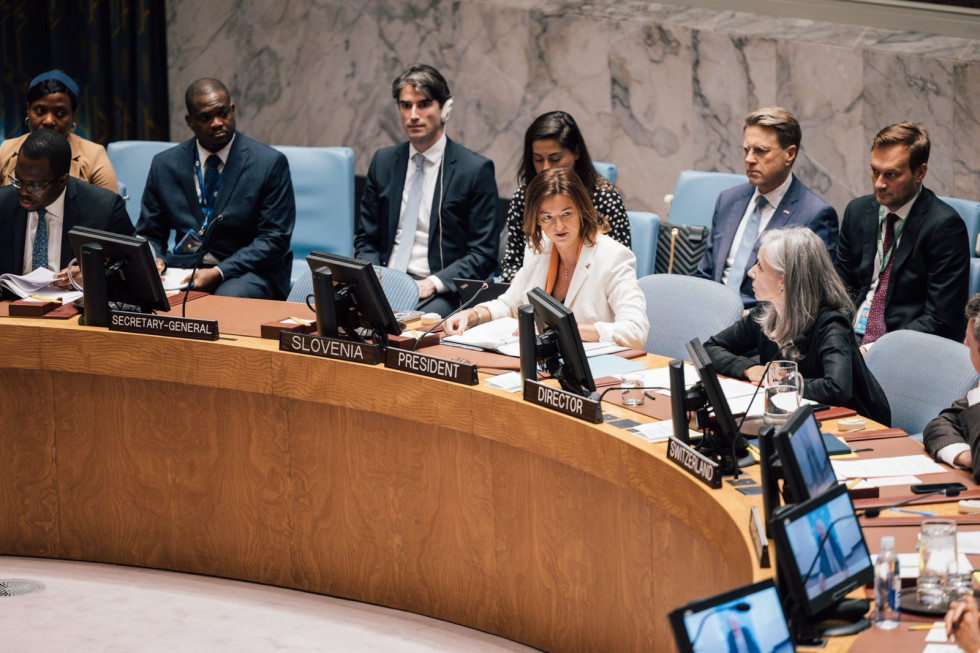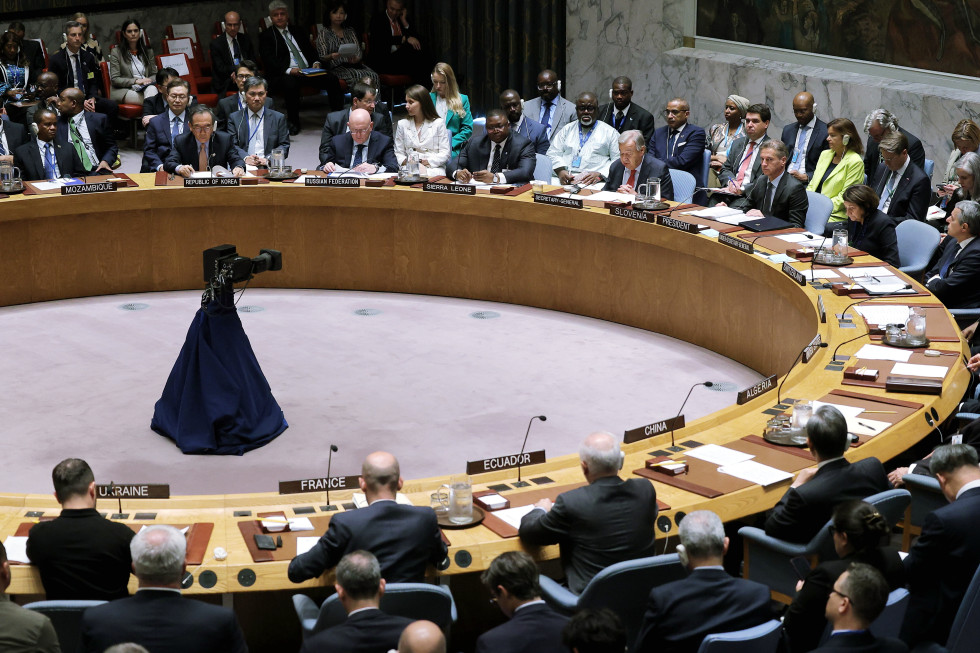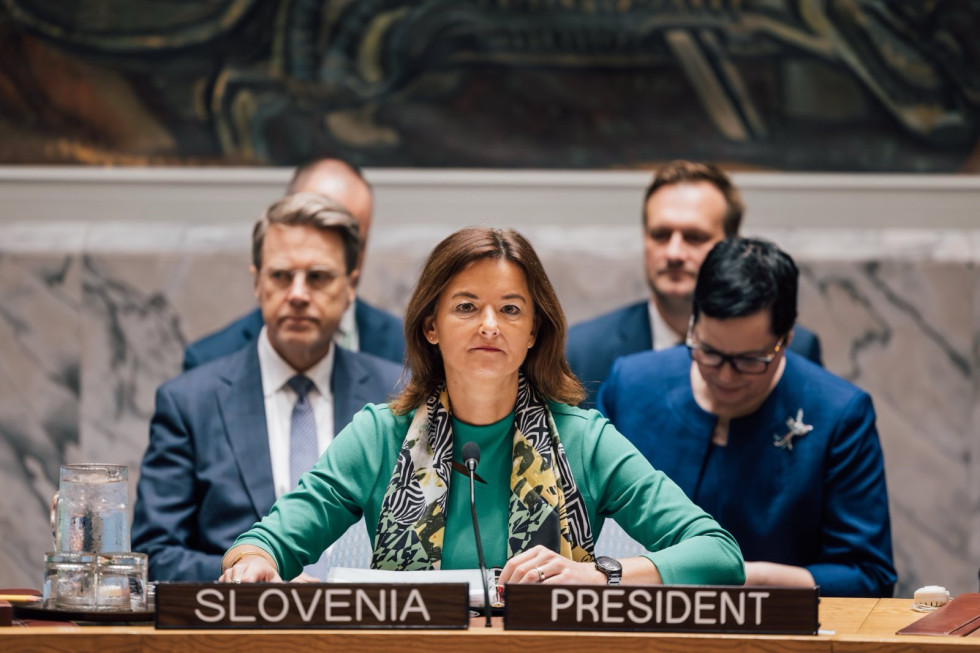Slovenia successfully concludes the first presidency of the UN Security Council
During the High-level Week, Slovenia organised its signature event – an open high-level debate on 'Leadership for Peace', chaired by Prime Minister Dr Robert Golob. Upon requests from other UNSC members, two high-level briefings on Ukraine and Gaza were also held that week and chaired by the Prime Minister.
During the High-level Week, the UNSC had two additional meetings. Following developments on the ground, the Security Council held a high-level briefing on Lebanon, chaired by Deputy Prime Minister and Minister for Foreign and European Affairs of Slovenia Tanja Fajon, who also moderated an informal interactive dialogue on cooperation between the Security Council and three countries representing the League of Arab Nations. In the week leading up to the High-level Week, Minister Fajon also chaired two briefings on Afghanistan and on illegal Israeli settlements in the West Bank.
More than 90 representatives of UN Member States participated in the open high-level debate on 'Leadership for Peace'. Prime Minister Golob stressed that since the very beginning of Slovenia’s membership of the UNSC, a gradual but steady erosion of the rules built after WWII has been felt, as well as an inability to respond decisively to major conflicts such as those in Gaza, Ukraine and Sudan. This is what prompted Slovenia to organise the Leadership for Peace debate. A Presidential Declaration was adopted at the start of the event, underlining the commitment of UNSC member states to the principles of the UN Charter and encouraging cooperation for a better and more peaceful world.
In its capacity as President, Slovenia responded to requests of UNSC members and organised a high-level briefing on the situation in Ukraine. European countries stand united in condemning Russia's aggression, which violates all principles of international law and the UN Charter. The trampling of international humanitarian law and the violation of the UN Charter must not win this war.
At a high-level briefing on Gaza, Prime Minister Golob stressed that the Security Council can no longer stand idle with the catastrophe unfolding before our eyes and called for the immediate launch of consultations on a possible new humanitarian resolution on Palestine.
During the briefing on Afghanistan focusing on women's and girls' rights and access to education, foreign minister Tanja Fajon expressed her concerns and stressed that Slovenia will continue to listen to and support Afghan women and that the international community must not turn their back on them. The next day, she chaired a briefing on Israeli settlements in the West Bank, during which she underscored the need to honour the commitments in view of a two-state solution, which remains the only way to a lasting peace. At an urgent high-level briefing on Lebanon, Minister Fajon called for restraint and de-escalation in the region and urged both Hezbollah and Israel to stop their attacks. At the end of September, Minister Fajon also chaired an informal dialogue on cooperation between the Security Council and the Arab League. Discussions focused on the tense situation in the Middle East, efforts to organise a peace conference for a lasting peace and a two-state solution, and the indispensable role of the UNRWA.
In early September, Slovenia organised an open debate entitled 'Strengthening UN Peacekeeping: Reflections for the Future'. The aim of the debate was to identify how the Council could better ensure unified political support to peacekeeping operations to enable them to fulfil their tasks and operate safely. The debate was an opportunity for UNSC members to reflect on how to build more trust and garner support for UN peacekeeping.
The first UNSC meeting under Slovenia's presidency took place on 4 September, when members discussed various aspects of the Middle East crisis. At the meeting, Slovenia again condemned the 7 October attack by Hamas and other armed groups and the hostage-taking. On 16 September, the Council discussed the situation in the Middle East, focusing on the implementation of resolution 2720 and the work of the UN High Coordinator for Humanitarian Aid and Reconstruction in Gaza. Slovenia reiterated the need to pursue a cascading approach in Gaza: to secure a durable ceasefire, restore basic services, launch a time-bound political process and implement the two-state solution, and start reconstruction.
In the wake of a series of attacks on 17 and 18 September, with remote detonations of electronic communication devices in Lebanon and Syria, Algeria requested an emergency meeting on Lebanon. In its statement, Slovenia condemned the wave of explosions in Lebanon and Syria, called for the full implementation of resolution 1701 and stressed that the region was at risk of an even greater conflict, which it could not withstand.
During Slovenia's presidency, the Council adopted two resolutions: on the renewal of sanctions under resolution 1591 for Sudan and on a one-year extension of the mandate of the Multinational Security Assistance Mission in Haiti. The Council published press statements on terrorist attacks in Afghanistan and Mali. Slovenia also organised two joint press stakeouts: one on women, peace and security before the briefing on Afghanistan and one on climate, peace and security before the open debate on UN peacekeeping operations.
On the margins of the ministerial meeting of the non-permanent members of the UNSC, ten current and five incoming non-permanent members agreed on a joint statement expressing the support for multilateralism and the importance of respecting the UN Charter.




